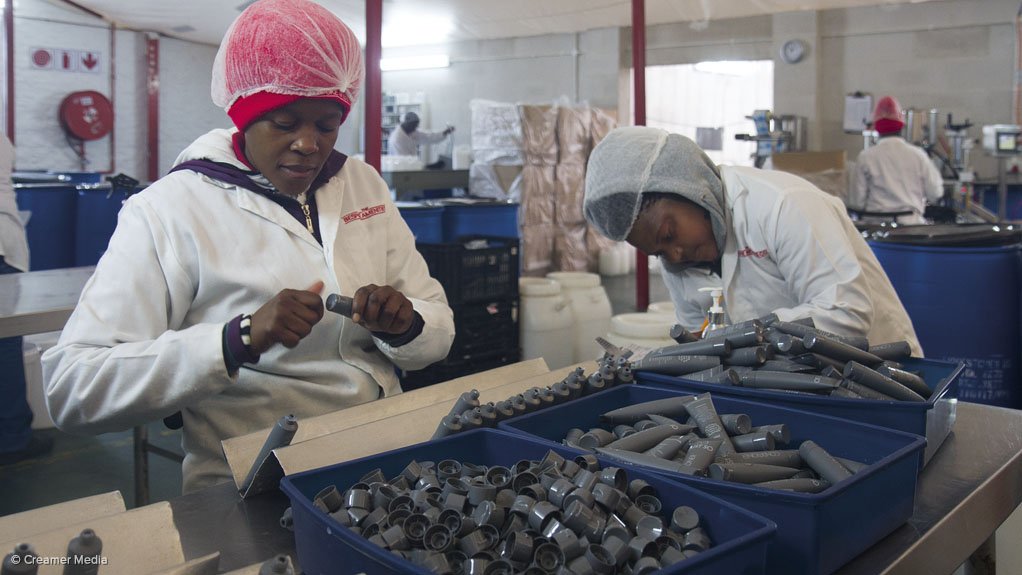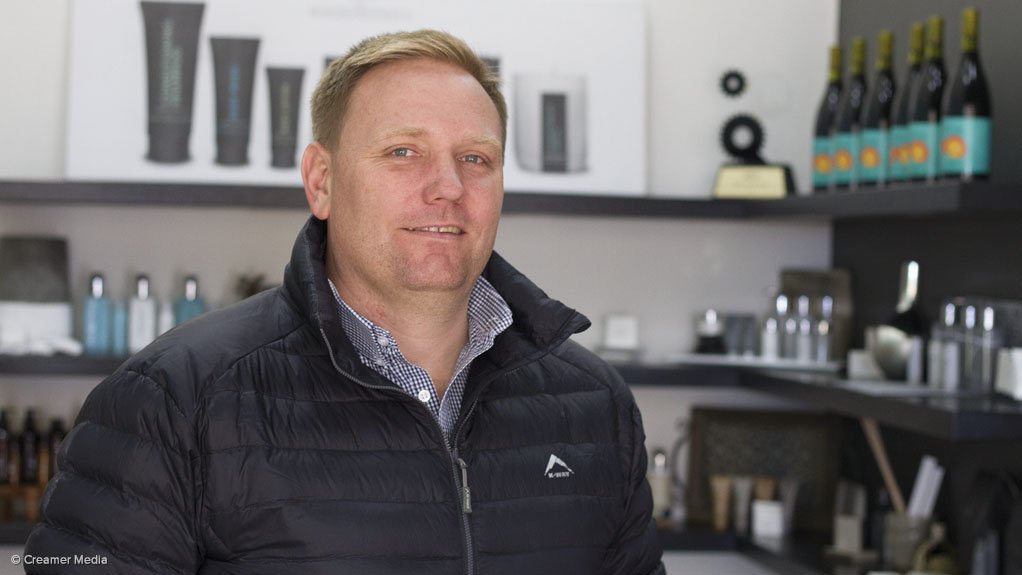Company showcasing opportunities that exist for local manufacturers



FINDING A GOOD MIX The company wants to create as many jobs as possible by using labour intensive processes with automated applications kept to a minimum
Photo by Duane Daws
BRUCE TURNER The manufacturing sector offers great potential to create jobs and address South Africa’s 27.7% unemployment rate
Photo by Duane Daws
South African amenities manufacturing company The Bespoke Amenities Company (TBAC) is striving to be an example of what is possible, if local companies are willing to invest in local manufacturing capabilities, states TBAC MD Bruce Turner.
The company was registered in 2012 and started trading in mid-2013. Prior to this, Turner had been working at a retail company which supplied imported hospitality and cosmetic products.
It was during his time at that company that he discovered that there was a “clear gap” between the type of products that were being imported from Europe and Asia and what was being produced locally.
“I felt that we could produce these kinds of [products] locally in a globally cost-competitive fashion and at the same or even a higher quality standard,” he tells Engineering News.
In addition to this, Turner wanted to ensure that he could create as many jobs as possible, which is one of the main reasons that TBAC’s factory in Kya Sands, in Johannesburg, uses labour-intensive processes, with automated applications kept to a minimum. He highlights that, despite this, the company has been able to keep its production costs per unit low.
The company currently has 110 employees, which will be increased to about 150 by the end of 2018. In general, the people that come to work at the company’s factory are unskilled and receive training to operate equipment or perform particular tasks.
“We believe that it is very important to provide people with skills and training, as it is very empowering for people to learn new skills, which will stand them in good stead for their future career development,” Turner elaborates.
Moreover, he says, contrary to some perceptions, he has found that South African factory workers have high levels of productivity. Turner surmises that a possible reason for this is that the legacy issues that workers and employees have in other sectors, such as mining, steel and construction, are not as stark, which assists in building genuine partnerships between management and labour for the good of the business.
Turner remarks that the manufacturing sector offers great potential to create jobs and address South Africa’s 27.7% unemployment rate. “I do not see another way in which South Africa can create jobs,” he says.
Turner believes that the biggest barrier to people manufacturing locally is their reluctance to try, with many having already conceded that it is just not possible, owing to operating challenges, such as high input costs, a lack of skills and labour instability.
He says his hope is that, through TBAC’s continued success, it will be able to disprove the sceptics and thereby showcase that there are “substantial opportunities” for the local manufacturing sector.
Further, Turner points out that there is also a perception that South Africa lacks skilled engineering service providers to cater to the needs of manufacturers. “This is also blatantly false.” He notes that, if a piece of equipment needs to be repaired or new parts are required, inevitably there is a company within a few kilometres of the factory that can provide cost-effective, high - quality assistance.
Moreover, Turner comments that, when the company first started manufacturing soap, all the moulds it used were manufactured in China. Currently, though, TBAC’s moulds are made by a local company, at less than the price for the imported ones and delivered in less than half the time, he highlights.
“There are pockets of real excellence in engineering and manufacturing throughout South Africa and it is just a case of getting it all together to ensure we unlock the country’s full potential in the sector,” he states.
TBAC is currently undergoing ISO 9001 accreditation for quality and ISO 22716 accreditation for the production, control, storage and shipment of cosmetic products. The company’s first final audit for these accreditations is scheduled for November.
The company has an internal quality assurance department, with the formulation development being outsourced to formulation specialists who have all helped in the development of about 100 product line variations, which include shampoo, soap, body lotion, bath salts, room sprays and insect repellent.
“We manufacture all our liquid products from raw materials, using locally sourced materials wherever possible,” Turner states. He says that this is true of all its product lines, as it is continually striving to use locally sourced materials for its products and has even successfully worked with a number of companies to develop these materials locally to reduce the need to import items and thereby also provide support for local upstream industries.
In addition to the range of guest amenities TBAC produces, the company also manufactures slippers, shower caps and shoe mitts.
The business offers off-the-shelf product lines and bespoke individually branded ranges as well. “Typically, we provide our customers with small products averaging 30 mℓ to 40 mℓ in size, which comprises about 40% of our sales,” says Turner.
Article Enquiry
Email Article
Save Article
Feedback
To advertise email advertising@creamermedia.co.za or click here
Press Office
Announcements
What's On
Subscribe to improve your user experience...
Option 1 (equivalent of R125 a month):
Receive a weekly copy of Creamer Media's Engineering News & Mining Weekly magazine
(print copy for those in South Africa and e-magazine for those outside of South Africa)
Receive daily email newsletters
Access to full search results
Access archive of magazine back copies
Access to Projects in Progress
Access to ONE Research Report of your choice in PDF format
Option 2 (equivalent of R375 a month):
All benefits from Option 1
PLUS
Access to Creamer Media's Research Channel Africa for ALL Research Reports, in PDF format, on various industrial and mining sectors
including Electricity; Water; Energy Transition; Hydrogen; Roads, Rail and Ports; Coal; Gold; Platinum; Battery Metals; etc.
Already a subscriber?
Forgotten your password?
Receive weekly copy of Creamer Media's Engineering News & Mining Weekly magazine (print copy for those in South Africa and e-magazine for those outside of South Africa)
➕
Recieve daily email newsletters
➕
Access to full search results
➕
Access archive of magazine back copies
➕
Access to Projects in Progress
➕
Access to ONE Research Report of your choice in PDF format
RESEARCH CHANNEL AFRICA
R4500 (equivalent of R375 a month)
SUBSCRIBEAll benefits from Option 1
➕
Access to Creamer Media's Research Channel Africa for ALL Research Reports on various industrial and mining sectors, in PDF format, including on:
Electricity
➕
Water
➕
Energy Transition
➕
Hydrogen
➕
Roads, Rail and Ports
➕
Coal
➕
Gold
➕
Platinum
➕
Battery Metals
➕
etc.
Receive all benefits from Option 1 or Option 2 delivered to numerous people at your company
➕
Multiple User names and Passwords for simultaneous log-ins
➕
Intranet integration access to all in your organisation

















